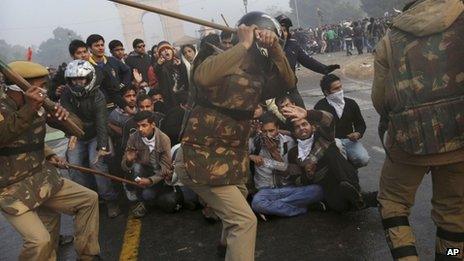India's rulers 'too slow' over rape protests
- Published
- comments

Have India's rulers become disengaged from the people?
As violent protests erupted in the capital, Delhi, at the weekend over the horrific gang rape of a 23-year-old student, many Indians were asking this question.
It took nearly a week of protests for Prime Minister Manmohan Singh to appear on TV pleading for calm and promising to make India safer for women. Many thought it was ironical that India's most powerful woman, Congress party chief Sonia Gandhi, met a group of outraged students, external only after massive public demonstrations had been widely televised.
Many believe that the violence could have been prevented if either Mr Singh or Mrs Gandhi, or even one of the young ministers, had gone to meet the protesters and promised stern action against wrongdoers and reform of India's broken criminal justice system.
That was not all. The city police commissioner told a news channel that even men were unsafe in Delhi as "their pockets were picked" - a shocking gaffe that appeared to equate rape with pick-pocketing. Federal Home Minister Sushil Kumar Shinde, external told another channel that ministers could not be expected to personally meet every group of protestors, "like political party workers or Maoists", appearing again to equate ultra-left rebels with angry students, justly upset over the rising tide of crimes against women.
Many attribute such attitudes to the sheer hubris of India's ruling class - "they are our rulers, not representatives", was an angry refrain during the protests last week - in what many cynics describe as a modern-day "feudal democracy".
Others argue it points to the increasing disconnect between India's rulers and its people, the perpetuation of what many call a paternalistic ruling class which talks to its citizens rather than listening to them. Many politicians and bureaucrats appear to lack communication skills to engage with a young, increasingly empowered and aspirational citizenry, who are demanding more from their rulers. "Young India, old politicians," as author Gurcharan Das once described this dichotomy.
Such alienation bodes ill for the future of the world's largest democracy, some think. Analysts like Pratap Bhanu Mehta argue that it leads to the disengagement of democracy from legitimacy. "India's citizens vote in large numbers", he says, "but if the same citizens were truly engaged in the process of making laws, laws would be seen as legitimate and there would be minimal need for enforcement".
I believe there is one more reason for this anomie: the decline of genuine mass politicians.
Time was when India was known for its charismatic, mass-based politicians - Jawaharlal Nehru, Indira Gandhi, Jayaprakash Narayan, external were just some of them - who could easily lead from the front. Today, there are only a handful, two of whom - Mayawati and Mamata Banerjee - are actually women. The reticent prime minister himself has never won an election, and Mrs Gandhi and her son and heir apparent, Rahul Gandhi, hardly speak to the citizens.
When he was going around Delhi in 1947 after India's bloody partition, Nehru saw Hindus and Muslims rioting. He jumped out of his car, broke the security cordon, ran into the crowd and stopped the clash. Mahatma Gandhi routinely travelled to trouble spots to stop religious clashes and douse tensions.
Last week, not a single leader came forward to engage with protesting students demanding safety for women.
- Published18 December 2012